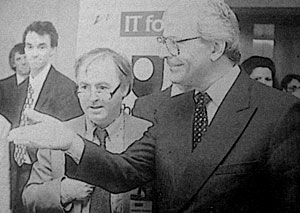
There are some things for which digital cameras are just useless. And of course at the back of every photographer’s mind at this time of the evening is Ansel Adams’s unforgettable picture of Hernandez, New Mexico.


There are some things for which digital cameras are just useless. And of course at the back of every photographer’s mind at this time of the evening is Ansel Adams’s unforgettable picture of Hernandez, New Mexico.

Sunset over East Anglia, this afternoon.
Lovely spoof from Owen Barder’s Blog.
Quentin alerted me to an interesting facility of the BlackBerry — direct handset-to-handset messaging. In the event of a catastrophic loss of network, email, or back-end infrastructure, BlackBerry users can take advantage of PIN-to-PIN messaging to communicate directly with similarly-equipped folks over the wireless network. Unlike email, PIN messages travel within RIM’s messaging network and are not routed through your organisation’s (or network’s) email servers. This provides greater speed of interaction and communications fault tolerance. BlackBerry PIN messaging will continue to work when email servers are down or when their connection to the Internet is disrupted. That’s one reason why BlackBerries are increasingly popular with governments and security services. Paradoxically, it’s also why they have become problematic for US banks and financial institutions in a post-Enron age. Many financial firms are bound by SEC and NASD regulations to archive and monitor all forms of communications between their employees and customers — and to avoid the liability of non-compliance, many have chosen to disable PIN messaging, thus reducing the communication flexibility provided by the BlackBerry device. Verily technology giveth and the law taketh away.
Normal Lebrecht ponders what happens when you can have everything on your bookshelf (or on your hard drive):
The complete works of Ingmar Bergman and Francois Truffaut are about to go on sale and no self-respecting cineaste will walk by without feeling a tug at the purse strings. To have and to hold every film that guided your artistic and emotional maturation, through adolescence and beyond, is something many will find irresistible. Kurosawa, Hitchcock, Tarkovsky and the Ealing comedies are equally on offer. What was formerly part of a romanticised past, glimpsed infrequently on late-night TV, has become urgently present (perhaps the perfect present). The eternally elusive turns up in plastic boxes.
What this means, in cultural terms, is that film now takes its place beside literature, music and visual imagery as an art that can be owned and bookmarked. Where once you had to visit a cinema or spool through half a mile of clunky videotape in order to access a seminal scene in an essential movie, you now zone into it on DVD as quickly as finding a name in the index of an artist biography.
This morning’s Observer column.
While the internet has been rampaging through the business models of the music, newspaper and movie industries, book publishers have been quietly hoping that if they keep their heads down the monster will go away. After all, print is rather low-tech and unsexy, and teenagers aren’t much interested in it, so the dangers of being ripped off wholesale by online text-sharing seemed remote…
From Good Morning, Silicon Valley…
WASHINGTON (AP) – Stung by continuing criticism, the world’s second-largest music label, Sony BMG Music Entertainment, promised Friday to temporarily suspend making music CDs with antipiracy technology that can leave computers vulnerable to hackers.
Sony defended its right to prevent customers from illegally copying music but said it will halt manufacturing CDs with the “XCP” technology as a precautionary measure. “We also intend to re-examine all aspects of our content protection initiative to be sure that it continues to meet our goals of security and ease of consumer use,” the company said in a statement.
The antipiracy technology, which works only on Windows computers, prevents customers from making more than a few copies of the CD and prevents them from loading the CD’s songs onto Apple Computer’s popular iPod portable music players. Some other music players, which recognize Microsoft’s proprietary music format, would work.
Sony’s announcement came one day after leading security companies disclosed that hackers were distributing malicious programs over the Internet that exploited the antipiracy technology’s ability to avoid detection. Hackers discovered they can effectively render their programs invisible by using names for computer files similar to ones cloaked by the Sony technology.
More… It turns out that Sony also has plans for Mac users too. According to this post, Darren Dittrich followed up on the discovery that Sony was playing a dirty trick on its customers, secretly installing a malware-style “root kit” on their computers via audio CDs:
I recently purchased Imogen Heap’s new CD (Speak for Yourself), an RCA Victor release, but with distribution credited to Sony/BMG. Reading recent reports of a Sony rootkit, I decided to poke around. In addition to the standard volume for AIFF files, there’s a smaller extra partition for “enhanced” content. I was surprised to find a “Start.app” Mac application in addition to the expected Windows-related files. Running this app brings up a long legal agreement, clicking Continue prompts you for your username/password (uh-oh!), and then promptly exits. Digging around a bit, I find that Start.app actually installs 2 files: PhoenixNub1.kext and PhoenixNub12.kext.
Personally, I’m not a big fan of anyone installing kernel extensions on my Mac. In Sony’s defense, upon closer reading of the EULA, they essentially tell you that they will be installing software. Also, this is apparently not the same technology used in the recent Windows rootkits (made by XCP), but rather a DRM codebase developed by SunnComm, who promotes their Mac-aware DRM technology on their site.
So, as I was saying the other day, the best thing is just to shun anything emanating from Sony.
… about the vote on the Terror Bill. I’m tired of all the media hyperbole about ‘defeat’. The scandal is not that Blair lost the vote, but that this is the first one he’s lost since he became Prime Minister in 1997. A sure sign that a deliberative democracy is working is occasional — or even regular — defeats of governments in Commons debates. It means that issues are being decided on the basis of MPs making up their own minds, rather than voting to the Whips’ instructions. But Blair’s first two (huge) parliamentary majorities meant that Britain was governed for nearly a decade by an elected dictatorship. Now at last we have something a little more representative — and possibly also a bit more reflective. Hooray!

All political careers end in failure, as the old adage goes. What is less often remarked is that most Prime Ministers go mad eventually. And the longer they are in power, the madder they get. By the time she was finally ejected, Margaret Thatcher was barmy. Watching the crazed run-up to yesterday’s government defeat in the House of Commons over the length of detention without charge to be allowed under the new Terror Bill, the thing that struck me most was how Blair steadily escalated the issue to the point where it was all about his ‘authority’. And that, of course is a dead giveaway. That, and his increasingly pop-eyed appearance in TV interview after TV interview in which he argues that He Knows Best. In that, he greatly resembles Thatcher — but with one important difference: whereas she always believed that she was Right, Blair believes that he is not only Right but Good.

The reason Prime Ministers go mad is simple. They live inside a bubble which comprehensively insulates them from the real world. I first discovered this when I met John Major, the last Tory Prime Minister, towards the end of his premiership (see fuzzy newspaper picture). At that time he was, to all intents and purposes, a busted flush — head of a sleazy, incompetent, incoherent, tired administration which was falling apart. Yet when I met him he was surrounded by four Cabinet ministers, and a phalanx of security people, flunkeys, secretaries and runners. I noticed that everyone, but everyone, around him was smiling, agreeing with him and generally being eager to please. It was “Prime Minister this” and “Prime Minister that”. If you didn’t know any better, you’d have assumed he was Caesar at the height of his powers. Yet, as I say, it was patently obvious that, electorally speaking, the man was dead meat.
That’s how British Prime Ministers live — with a coterie of lackeys who treat them like Gods and insulate them from the real world. It’s basically a reality-distortion field. Tony Blair’s been inside such a field since 1997, and boy is it beginning to show.